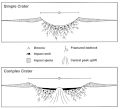Victoria Island Structure
The Victoria Island structure is a 5.5 km (3 mi) bowl-shaped structure buried in the shale sediments of the Sacramento-San Joaquin River Delta, 12 miles (19 km) west of Stockton, California. The circular structure is part of a former sea bed, and lies 1,490–1,600 meters (4,890–4,250 ft) below sea level.
Discovered during oil exploration and reported at the Lunar and Planetary Science Conference in Houston, Texas, in March 2007, it is thought to be a buried impact crater formed between 37 and 49 million years ago.
Victoria Island, which the structure is named for, is in the San Joaquin River Delta at approximately 37°53′24″N 121°32′06″W / 37.890°N 121.535°W. The current publications do not list a more precise location for the impact structure than the island.
See also
References
- ^ Rajmon, D. "Impact Database 2009.2". Impact Field Studies Group. entry for "Victoria Island". Retrieved 2010-03-16.
- ^ Paul Rincon (2007). 'Crater' spied under California, BBC News
- ^ Spevack, S. C., Morrow, J. R., Spevack, B. Z. (2007). "3-D seismic and well log analyses of the Victoria Island Structure, a Potential Buried Impact Crater, San Joaquin County, California" (.PDF). Lunar and Planetary Science Conference XXXVIII. Retrieved 2009-09-17.
{{cite web}}: CS1 maint: multiple names: authors list (link) - ^ Roach, John (2007-03-27). "Giant Meteorite Hit Ancient California, Crater Study Suggests". National Geographic News. National Geographic Society. Archived from the original on April 4, 2007. Retrieved 2009-09-01.
- ^ "Victoria Island". Geographic Names Information System. United States Geological Survey, United States Department of the Interior.
External links

